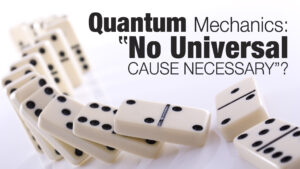Quantum Mechanics: "No Universal Cause Necessary"?
Quantum Mechanics: "No Universal Cause Necessary"?
Q:
If causality fails in quantum mechanics, doesn’t that prove that a Universal Cause isn’t necessary?
A:
Writing in Nature, Howard Wiseman, Professor of Physics at Griffith University, explained that, “In 1964, Northern Irish physicist John Bell proved mathematically that certain quantum correlations, unlike all other correlations in the Universe, cannot arise from any local cause.”1 Does that mean that a cause for the Universe is unnecessary? If a “quantum fluctuation” does not necessarily require a local cause, doesn’t that mean that a Universe-generating quantum fluctuation would not necessarily require a cause?
The key word that must not be overlooked in a proper understanding of Bell’s Theorem is the word “local.” In order to answer the above questions, that term must be defined and understood. Consider a simplified example: it takes about eight minutes for light from the Sun to reach Earth. But let’s say you were standing on the Sun by yourself, without any interaction with me, but every time I clicked my computer mouse on Earth, you immediately and uncontrollably hopped. There was not a delay of eight minutes. The effect was immediate. The effect of you hopping would be the result of a “non-local” cause. In his article, “Spooky Action at a Distance,” Dr. Gary Felder, Professor of Physics at Smith College, explains locality as “the principle that an event which happens at one place can’t instantaneously affect an event someplace else. For example: if a distant star were to suddenly blow up tomorrow, the principle of locality says that there is no way we could know about this event or be affected by it until something, e.g. a light beam, had time to travel from that star to Earth.”2 The question is, does that principle always hold true? According to what’s known as Bell’s Theorem, at the quantum level, the principle of locality does not hold true. Jacob Aron, writing in New Scientist, explained that in quantum theory, “particles could become entangled, so that measuring one would instantly influence the measurement of the other, even if they were far apart.”3 Felder explained: “Bell proved that the results predicted by quantum mechanics could not be explained by any theory which preserved locality. In other words, if you set up an experiment like that described by Einstein, Podolsky, and Rosen, and you get the results predicted by quantum mechanics, then there is no way that locality could be true…. In short, locality is dead.”4
Now what does this mean for using the Law of Causality to prove the Universe could not create itself?5 Three quick points to consider in response to that question:
- Most important: even if Bell’s Theorem holds true, and it very well may, it does not disprove the Law of Causality—i.e., the need of a cause for every effect in the Universe. Bell’s Theorem argues that there is not a need for a local cause at the quantum level (i.e., locality), but it does not claim that there is not still a necessary relationship between cause and effect—i.e., that causality still holds. While Bell experiments seem to show that there is not always a direct correlation between a cause and effect at the local level, scientists see that there does still seem to be a correlation between the causes and effects in Bell’s Theorem experiments, even if the correlation is not local. According to Bell’s Theorem, a cause can create a distant effect instantly without apparent (or, at least, understandable) interaction (e.g., separated electrons can “affect each other instantly”6), but there is still an acknowledged relationship between the cause and effect even if it is distant and immediate. My clicks are undeniably causing you to jump, even if we do not understand why. In the words of Wiseman, concerning the non-local reality interpretation of Bell’s Theorem, it is possible that “the setting of one measuring device can influence the reading of another instrument, however remote”7—i.e., the cause and effect are still apparently correlated. So, Bell’s Theorem may highlight another type of cause and effect relationship, but it does not negate the need for a cause in the first place.
- Scientists recognize that they do not completely understand why Bell’s Theorem seems to hold true. They acknowledge that there may be things we have not discovered about reality which could affect our understanding of what is happening at the quantum level and which could prove that the cause is ultimately still “local.”8 In other words, compared to what we know about the macroscopic realm from centuries of study, we are relative novices when it comes to the study of the quantum world. We simply do not have all the answers as to what is happening in that realm, but, on the other hand, the evidence for the Law of Causality is abundant and undeniable.
- Scientists even acknowledge that Bell’s Theorem may be false and that further investigation and accumulation of knowledge may reveal that fact. According to Felder, hidden assumptions (e.g., the assumption that “no signal can propagate faster than the speed of light,” which is a fundamental element of Einstein’s theory of relativity) could be corrupting the Bell experiment results.9 Wiseman conceded that “[b]efore investing too much angst or money, one wants to be sure that Bell correlations really exist. As of now, there are no loophole-free Bell experiments.”10
Bottom line: all observed evidence in the Universe, whether at the quantum or super-quantum level, indicates that in the realm in which we live, an effect must have a cause. The Universe is an effect, and if one is to be rational (i.e., follow the evidence we have at our disposal), he must acknowledge that there must be an ultimate cause for the Universe, whether it be local or non-local. According to the evidence, that Cause is none other than the God of the Bible.11
Endnotes
1 Howard Wiseman (2014), “Bell’s Theorem Still Reverberates,” Nature, 510[7506]:467-469, p. 467.
2 Gary Felder (1999), “Spooky Action at a Distance,” Math and Physics Help, http://www.felderbooks.com/papers/bell.html, italics in orig.
3 Jacob Aron (2015), “Quantum Weirdness is Reality,” New Scientist, 227[3037]:8-9, September 5, p. 8.
4 Felder.
5 Jeff Miller (2011), “God and the Laws of Science: The Law of Causality,” Apologetics Press, https://apologeticspress.org/APContent.aspx?category=12&article=3716&topic=90.
6 Felder.
7 Wiseman, p. 468.
8 Felder.
9 Ibid.
10 Wiseman, p. 468.
11 Jeff Miller (2015), “How Can a Person Know Which God Exists?” Reason & Revelation, 35[5]:52-53, May, https://apologeticspress.org/pub_rar/35_5/1505.pdf

REPRODUCTION & DISCLAIMERS: We are happy to grant permission for this article to be reproduced in part or in its entirety, as long as our stipulations are observed.



0 Comments:
Post a Comment
<< Home